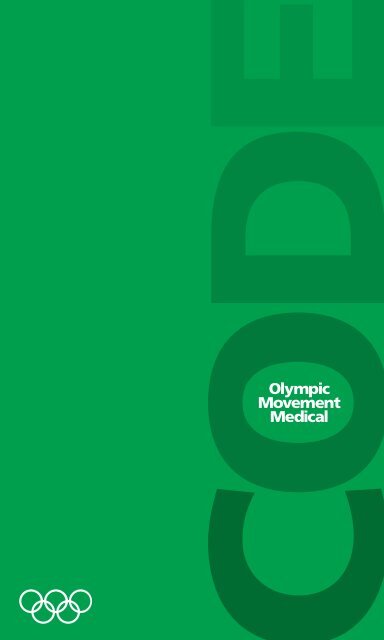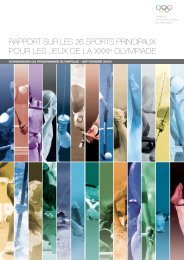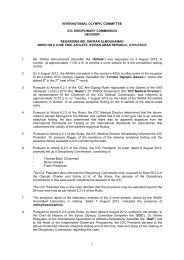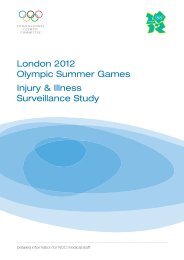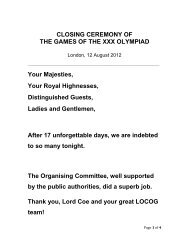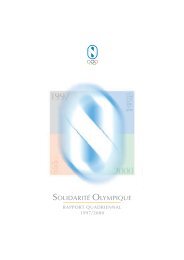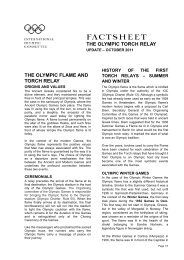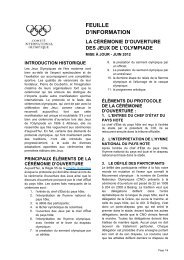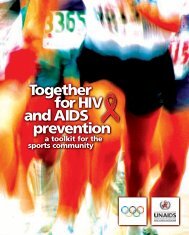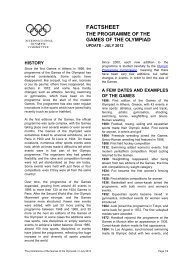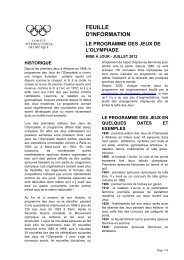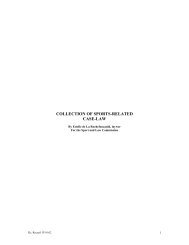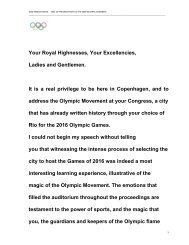Create successful ePaper yourself
Turn your PDF publications into a flip-book with our unique Google optimized e-Paper software.
Olympic<br />
Movement<br />
Medical
Olympic Movement Medical Code<br />
In force as from 1 January 2006
Olympic Movement Medical Code<br />
Contents<br />
Preamble 2<br />
Chapter 1: Relationships Between Athletes and<br />
Health Care Providers<br />
1. General Principles 3<br />
2. Information 3<br />
3. Consent 3<br />
4. Confidentiality and Privacy 4<br />
5. Care and Treatment 5<br />
6. Rights and Duties of Health Care Providers 6<br />
Chapter 2: Protection and Promotion of the Athlete’s<br />
Health during Training and Competition<br />
7. General Principles 9<br />
8. Fitness to Practise a Sport 10<br />
9. Medical Support 10<br />
Chapter 3: Adoption, Compliance and Monitoring<br />
10. Adoption 13<br />
11. Compliance 13<br />
12. Complaints Procedure 13<br />
13. Monitoring 14<br />
Chapter 4: Scope, Entry into Force and Amendments<br />
14. Scope 15<br />
15. Entry into Force 15<br />
16. Amendments 15<br />
1
Olympic Movement Medical Code<br />
Preamble<br />
“Fundamental Principles of Olympism<br />
1. Olympism is a philosophy of life, exalting and combining in a<br />
balanced whole the qualities of body, will and mind. Blending<br />
sport with culture and education, Olympism seeks to create a<br />
way of life based on the joy of effort, the educational value of<br />
good example and respect for universal fundamental<br />
ethical principles.<br />
2. The goal of Olympism is to place sport at the service of the<br />
harmonious development of man, with a view to promoting a<br />
peaceful society concerned with the preservation of<br />
human dignity.”<br />
Olympic Charter, September 2004<br />
1. The Olympic Movement, in accomplishing its mission, should take<br />
care that sport is practised without danger to the health of the<br />
athletes and with respect for fair play and sports ethics. To that<br />
end, it takes the measures necessary to protect the health of<br />
participants and to minimise the risks of physical injury and<br />
psychological harm. It also protects the athletes in their<br />
relationships with physicians and other health care providers.<br />
2. This objective can be achieved only through an ongoing<br />
education based on the ethical values of sport and on each<br />
individual’s responsibility in protecting his or her health and the<br />
health of others.<br />
3. The present Code recalls the basic rules regarding best medical<br />
practices in the domain of sport and the safeguarding of the rights<br />
and health of the athletes. It supports and encourages the adoption<br />
of specific measures to achieve that objective. It complements and<br />
reinforces the World Anti-Doping Code and reflects the general<br />
principles recognised in the international codes of medical ethics.<br />
4. The Olympic Movement Medical Code is intended to apply to the<br />
Olympic Games, the various championships of the International<br />
Federations and all competitions to which the International<br />
Olympic Committee (<strong>IOC</strong>) grants its patronage or support, and to<br />
all sport practised within the context of the Olympic Movement,<br />
either during training or during competition.<br />
2
Chapter 1<br />
Relationships Between Athletes and<br />
Health Care Providers<br />
1. General principles<br />
1.1. Athletes are entitled to the same fundamental rights as all<br />
patients in their relationships with physicians and health care<br />
providers, in particular the right to respect for:<br />
a. their human dignity;<br />
b. their physical and mental integrity;<br />
c. the protection of their health and safety;<br />
d. their self-determination; and<br />
e. their privacy and confidentiality.<br />
1.2. The relationship between athletes, their personal physician, the<br />
team physician and other health care providers must be<br />
protected and subject to mutual respect. The health and the<br />
welfare of athletes must prevail over the sole interest of<br />
competition and other economic, legal or political<br />
considerations.<br />
2. Information<br />
2. Athletes have the right to be informed in a clear and appropriate<br />
way about their health status and their diagnosis; preventive<br />
measures; proposed medical interventions, together with the<br />
risks and benefits of each intervention; alternatives to proposed<br />
interventions, including the consequences of non-treatment for<br />
their health and for their return to sports practice; and the<br />
prognosis and progress of treatment and rehabilitation measures.<br />
3. Consent<br />
Olympic Movement Medical Code<br />
3.1. The voluntary and informed consent of the athletes is required<br />
for any medical intervention.<br />
3.2. Particular care should be taken to avoid pressures from the<br />
entourage (e.g. coach, management, family, etc.) and other<br />
athletes, so that athletes can make fully informed decisions,<br />
3
Olympic Movement Medical Code<br />
taking into account the risks associated with practising a sport<br />
with a diagnosed injury or disease.<br />
3.3. Athletes have the right to refuse or to interrupt a medical<br />
intervention. The consequences of such a decision must be<br />
carefully explained to them.<br />
3.4. Athletes are encouraged to designate a person who can act on<br />
their behalf in the event of incapacity. They can also define in<br />
writing the way they wish to be treated and give any other<br />
instruction they deem necessary.<br />
3.5. With the exception of emergency situations, when athletes are<br />
unable to consent personally to a medical intervention, the<br />
authorisation of their legal representative or of the person<br />
designated by the athletes for this purpose is required, after<br />
they have received the necessary information.<br />
When the legal representative has to give authorisation,<br />
athletes, whether minors or adults, must nevertheless assent to<br />
the medical intervention to the fullest extent of their capacity.<br />
3.6. The consent of the athletes is required for the collection,<br />
preservation, analysis and use of any biological sample.<br />
4. Confidentiality and Privacy<br />
4.1. All information about an athlete’s health status, diagnosis,<br />
prognosis, treatment, rehabilitation measures and all other<br />
personal information must be kept confidential, even after the<br />
death of the athlete.<br />
4.2. Confidential information may be disclosed only if the athlete<br />
gives explicit consent thereto, or if the law expressly provides for<br />
this. Consent may be presumed when, to the extent necessary<br />
for the athlete’s treatment, information is disclosed to other<br />
health care providers directly involved in his or her health care.<br />
4.3. All identifiable medical data on athletes must be protected. The<br />
protection of the data must be appropriate to the manner of<br />
their storage. Likewise, biological samples from which<br />
identifiable data can be derived must be protected.<br />
4.4. Athletes have the right of access to, and a copy of, their<br />
4
Olympic Movement Medical Code<br />
complete medical record. Such access excludes data concerning<br />
or provided by third parties.<br />
4.5. Athletes have the right to demand the rectification of erroneous<br />
medical data.<br />
4.6. An intrusion into the private life of an athlete is permissible only<br />
if it is necessary for diagnosis, treatment and care, and the<br />
athlete consents to it, or if it is legally required. Such intrusion is<br />
also permissible pursuant to the provisions of the World Anti-<br />
Doping Code.<br />
4.7. Any medical intervention must respect privacy. This means that<br />
a given intervention may be carried out in the presence of only<br />
those persons who are necessary for the intervention, unless the<br />
athlete expressly consents or requests otherwise.<br />
5. Care and Treatment<br />
5.1. Athletes have the right to receive such health care as is<br />
appropriate to their needs, including preventive care, activities<br />
aimed at health promotion and rehabilitation measures. Services<br />
should be continuously available and accessible to all equitably,<br />
without discrimination and according to the financial, human<br />
and material resources available for such purpose.<br />
5.2. Athletes have the right to a quality of care marked both by high<br />
technical standards and by the professional and respectful<br />
attitude of health care providers. They have the right to<br />
continuity of care, including cooperation between all health care<br />
providers and establishments which are involved in their<br />
diagnosis, treatment and care.<br />
5.3. During training and competition abroad, athletes have the right<br />
to the necessary health care, which if possible should be<br />
provided by their personal physician or the team physician.<br />
They also have the right to receive emergency care prior to<br />
returning home.<br />
5.4. Athletes have the right to choose and change their own<br />
physician, health care provider or health care establishment,<br />
provided that this is compatible with the functioning of the<br />
health care system. They have the right to request a second<br />
medical opinion.<br />
5
Olympic Movement Medical Code<br />
5.5. Athletes have the right to be treated with dignity in relation to<br />
their diagnosis, treatment, care and rehabilitation, in accordance<br />
with their culture, tradition and values. They have the right to<br />
enjoy support from family, relatives and friends during the course<br />
of care and treatment, and to receive spiritual support and<br />
guidance.<br />
5.6. Athletes have the right to relief of their suffering according to<br />
the latest recognised medical knowledge. Treatments with an<br />
analgesic effect, which allow an athlete to practise a sport with<br />
an injury or illness, should be carried out only after careful<br />
consideration and consultation with the athlete and other health<br />
care providers. If there is a long-term risk to the athlete’s health,<br />
such treatment should not be given.<br />
Procedures that are solely for the purpose of masking pain or<br />
other protective symptoms in order to enable the athlete to<br />
practise a sport with an injury or illness should not be<br />
administered if, in the absence of such procedures, his or her<br />
participation would be medically inadvisable or impossible.<br />
6. Rights and Duties of Health Care Providers<br />
6.1. The same ethical principles that apply to the current practice of<br />
medicine apply to sports medicine. The principal duties of the<br />
physicians and other health care providers include:<br />
a. making the health of the athletes a priority;<br />
b. doing no harm.<br />
6.2. Health care providers who care for athletes must have the<br />
necessary education, training and experience in sports medicine,<br />
and must keep their knowledge up to date. They have a duty to<br />
understand the physical and emotional demands placed upon<br />
athletes during training and competition, as well as the<br />
commitment and necessary capacity to support the<br />
extraordinary physical and emotional endurance that sport<br />
requires.<br />
6.3. Athletes’ health care providers must act in accordance with the<br />
latest recognised medical knowledge and, when available,<br />
evidence-based medicine. They must refrain from performing any<br />
intervention that is not medically indicated, even at the request<br />
6
Olympic Movement Medical Code<br />
of the athletes, their entourage or another health care provider.<br />
Health care providers must also refuse to provide a false medical<br />
certificate concerning the fitness of an athlete to participate in<br />
training or competition.<br />
6.4. When the health of athletes is at risk, health care providers<br />
must strongly discourage them from continuing training or<br />
competition and inform them of the risks.<br />
In the case of serious danger to the athlete, or when there is a<br />
risk to third parties (players of the same team, opponents, family,<br />
the public, etc.), health care providers may also inform the<br />
competent persons or authorities, even against the will of the<br />
athletes, about their unfitness to participate in training or<br />
competition.<br />
6.5. Health care providers must oppose any sports or physical activity<br />
that is not appropriate to the stage of growth, development,<br />
general condition of health, and level of training of children.<br />
They must act in the best interest of the health of the children or<br />
adolescents, without regard to any other interests or pressures<br />
from the entourage (e.g. coach, management, family, etc.) or<br />
other athletes.<br />
6.6. Health care providers must disclose when they are acting on<br />
behalf of third parties (e.g. club, federation, organiser, NOC,<br />
etc.). They must personally explain to the athletes the reasons for<br />
the examination and its outcome, as well as the nature of the<br />
information provided to third parties. In principle, the athlete’s<br />
physician should be informed.<br />
6.7. When acting on behalf of third parties, health care providers<br />
must limit the transfer of information to what is essential. In<br />
principle, they may indicate only the athlete’s fitness or<br />
unfitness to participate in training or competition. With the<br />
athlete’s consent, the health care providers may provide other<br />
information concerning the athlete’s participation in sport in a<br />
way compatible with his or her health status.<br />
6.8. At sports venues, it is the responsibility of the team or<br />
competition physician to determine whether an injured athlete<br />
may continue in or return to the competition. This decision may<br />
not be delegated to other professionals or personnel. In the<br />
absence of the competent physician, these individuals must<br />
7
Olympic Movement Medical Code<br />
adhere strictly to the instructions that he or she has provided.<br />
At all times, the priority must be to safeguard the health and<br />
safety of athletes. The outcome of the competition must never<br />
influence such decisions.<br />
6.9. When necessary, the team or competition physician must ensure<br />
that injured athletes have access to specialised care, by<br />
organising medical follow-up by recognised specialists.<br />
8
Chapter 2<br />
Protection and Promotion of the<br />
Athlete’s Health during Training and<br />
Competition<br />
7. General Principles<br />
Olympic Movement Medical Code<br />
7.1. No practice constituting any form of physical injury or<br />
psychological harm to athletes is permissible. The members of<br />
the Olympic Movement ensure that the athletes’ conditions of<br />
safety, well-being and medical care are favourable to their<br />
physical and mental equilibrium. They must adopt the necessary<br />
measures to achieve this end and to minimise the risk of injuries<br />
and illness. The participation of sports physicians is desirable in<br />
the drafting of such measures.<br />
7.2. In each sports discipline, minimal safety requirements must be<br />
defined and applied with a view to protecting the health of the<br />
participants and the public during training and competition.<br />
Depending on the sport and the level of competition, specific<br />
rules are adopted regarding the sports venues, the safe<br />
environmental conditions, the sports equipment authorised or<br />
prohibited, and the training and competition programmes. The<br />
specific needs of each athlete category must be respected.<br />
7.3. For the benefit of all concerned, measures to safeguard the<br />
health of the athletes and to minimise the risks of physical<br />
injury and psychological harm must be publicised in order to<br />
benefit all those concerned.<br />
7.4. The measures for the protection and the promotion of the<br />
athletes’ health must be based on the latest recognised medical<br />
knowledge.<br />
7.5. Research in sports medicine and sports sciences is encouraged. It<br />
must be conducted in accordance with the recognised principles<br />
of research ethics, in particular the Helsinki Declaration adopted<br />
by the World Medical Association (Edinburgh, 2000), and the<br />
applicable law. It must never be conducted in a manner which<br />
could harm an athlete’s health or jeopardise his or her<br />
performance. The voluntary and informed consent of the<br />
9
athletes to participate in such research is required.<br />
7.6. Advances in sports medicine and sports science must not be<br />
withheld, and must be published and widely disseminated.<br />
8. Fitness to Practise a Sport<br />
8.1. Except when there are symptoms or a significant family medical<br />
history, the practice of sport for all does not require undergoing<br />
a fitness test. The choice to undergo such a test is the<br />
responsibility of the personal physician.<br />
8.2. For competitive sport, athletes may be required to present a<br />
medical certificate confirming that there are no apparent<br />
contraindications. The fitness test should be based on the latest<br />
recognised medical knowledge and performed by a specially<br />
trained physician.<br />
8.3. A pre-participation medical test is recommended for high level<br />
athletes. It should be performed under the responsibility of a<br />
specially trained physician.<br />
8.4. Any genetic test that attempts to gauge a particular capacity to<br />
practise a sport constitutes a medical evaluation to be<br />
performed solely under the responsibility of a specially trained<br />
physician.<br />
9. Medical Support<br />
Olympic Movement Medical Code<br />
9.1. In each sports discipline, guidelines must be established<br />
regarding the necessary medical support depending on the<br />
nature of the sports activities and the level of competition.<br />
These guidelines must define, but not be limited to, the<br />
following points:<br />
• the medical coverage of training and competition venues and<br />
how this is organised;<br />
• the necessary resources (supplies, premises, vehicles, etc.);<br />
• the procedures in case of emergencies;<br />
• the system of communication between the medical support<br />
services, the organisers and the competent health authorities.<br />
9.2. In the case of a serious incident occurring during training or<br />
10
Olympic Movement Medical Code<br />
competition, there must be procedures to provide the necessary<br />
support to those injured, by evacuating them to the competent<br />
medical services when needed. The athletes, coaches and<br />
persons associated with the sports activity must be informed of<br />
those procedures and receive the necessary training for their<br />
implementation.<br />
9.3. To reinforce safety in the practice of sports, a mechanism must<br />
exist to allow for data collection with regard to injuries<br />
sustained during training or competition. When identifiable,<br />
such data must be collected with the consent of those<br />
concerned, and be treated confidentially and in accordance with<br />
the recognised ethical principles of research.<br />
11
Olympic Movement Medical Code<br />
12
Chapter 3<br />
Adoption, Compliance and Monitoring<br />
10. Adoption<br />
10.1. The Code is intended to apply to all the members of the<br />
Olympic Movement, in particular the <strong>IOC</strong>, the International<br />
Sports Federations and the National Olympic Committees<br />
(hereafter the Signatories). Each Signatory adopts the Code<br />
according to its own procedural rules.<br />
10.2. The Code is first adopted by the <strong>IOC</strong>. It is not mandatory but<br />
desirable that the other members of the Olympic Movement<br />
adopt it.<br />
10.3. A list of all Signatories will be made public by the <strong>IOC</strong>.<br />
11. Compliance<br />
Olympic Movement Medical Code<br />
11.1. The Signatories implement the applicable Code provisions<br />
through policies, statutes, rules or regulations according to their<br />
authority and within their respective spheres of responsibility.<br />
They undertake to make the principles and provisions of the<br />
Code widely known, by active and appropriate means. For that<br />
purpose, they collaborate closely with the relevant physicians’<br />
and health care providers’ associations and the competent<br />
authorities.<br />
11.2. The Signatories ensure that the physicians and other health care<br />
providers caring for athletes within their spheres of<br />
responsibility act in accordance with this Code.<br />
11.3. Physicians and other health care providers remain bound to<br />
respect their own ethical and professional rules in addition to<br />
the applicable Code provisions. In the case of any discrepancy,<br />
the most favourable rule that protects the health, the rights and<br />
the interests of the athletes shall prevail.<br />
12. Complaints Procedure<br />
12.1. Each Signatory designates a competent body to deal with<br />
13
complaints concerning alleged violations of the applicable Code<br />
provisions and with all other situations brought to its attention<br />
concerning the implementation of the Code. This body must<br />
have the power to take sanctions against the person or<br />
organisation at fault or to propose sanctions or the necessary<br />
measures to other authorised bodies.<br />
12.2. The <strong>IOC</strong> Medical Commission designates a committee<br />
(hereafter: Complaints Committee), composed of three of its<br />
members, to deal with all cases of alleged violations of the<br />
applicable Code provisions occurring during the Games. This<br />
Committee also acts as a body to review decisions taken by the<br />
competent bodies of the Signatories pursuant to the Code. A<br />
request for a review may be submitted to this Committee by the<br />
person or organisation sanctioned, as well as by the claimant.<br />
12.3. Decisions taken by the Complaints Committee in the first<br />
instance may be submitted to the <strong>IOC</strong> Executive Board for<br />
review. Decisions taken by the Complaints Committee as a<br />
review body and those taken by the <strong>IOC</strong> Executive Board<br />
are final.<br />
12.4. The Signatories establish the necessary procedural rules,<br />
including the applicable sanctions in the event of a violation of<br />
the applicable Code provisions. The competent bodies of the<br />
Signatories and the Complaints Committee have the power to<br />
act upon the filing of a complaint or under their own authority.<br />
13. Monitoring<br />
Olympic Movement Medical Code<br />
13.1. The <strong>IOC</strong> Medical Commission oversees the implementation of<br />
the Code and receives feedback relating to it. It is also<br />
responsible for monitoring changes in the field of ethics and<br />
best medical practice and for proposing adaptations to<br />
the Code.<br />
13.2. The <strong>IOC</strong> Medical Commission may issue recommendations and<br />
models of best practice with a view to facilitating the<br />
implementation of the Code.<br />
14
Chapter 4<br />
Scope, Entry into Force and<br />
Amendments<br />
14. Scope<br />
14.1. The Code applies to all participants in the sports activities<br />
governed by each Signatory, in competition as well as out of<br />
competition.<br />
14.2. The Signatories are free to grant wider protection to their<br />
athletes.<br />
14.3. The Code applies without prejudice to the national and<br />
international ethical, legal and regulatory requirements that are<br />
more favourable to the protection of the health, rights and<br />
interests of the athletes.<br />
15. Entry into Force<br />
15.1. The Code enters into force for the <strong>IOC</strong> on 1 January 2006. It<br />
applies to all Olympic Games, starting with the 2006 Games<br />
in Turin.<br />
15.2. The Code may be adopted by the other members of the<br />
Olympic Movement after this date. Each Signatory determines<br />
when such adoption will take effect.<br />
15.3. The Signatories may withdraw acceptance of the Code after<br />
providing the <strong>IOC</strong> with written notice of their intent to<br />
withdraw.<br />
16. Amendments<br />
Olympic Movement Medical Code<br />
16.1. Athletes, Signatories and other members of the Olympic<br />
Movement are invited to participate in improving and<br />
modifying the Code. They may propose amendments.<br />
16.2. Upon the recommendation of its Medical Commission, the <strong>IOC</strong><br />
initiates proposed amendments to the Code and ensures a<br />
consultative process, both to receive and respond to<br />
15
Olympic Movement Medical Code<br />
recommendations, and to facilitate review and feedback from<br />
athletes, Signatories and members of the Olympic Movement<br />
on proposed amendments.<br />
16.3. After appropriate consultation, amendments to the Code are<br />
approved by the <strong>IOC</strong> Executive Board. Unless provided<br />
otherwise, they become effective three months after such<br />
approval.<br />
16.4. Each Signatory must adopt the amendments approved by the<br />
<strong>IOC</strong> Executive Board within one year after notification of such<br />
amendments. Failing this, a Signatory may no longer claim that<br />
it complies with the Olympic Movement Medical Code.<br />
Adopted by the <strong>IOC</strong> Executive Board in Lausanne on<br />
27 October 2005<br />
16


